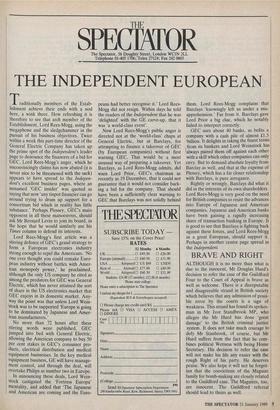SPECT TRE AT OR
The Spectator, 56 Doughty Street, London WC1N 2LL Telephone 01-405 1706; Telex 27124; Fax 242 0603
THE INDEPENDENT EUROPEAN
Traditionally members of the Estab- lishment achieve their ends with a nod here, a wink there. How refreshing it is therefore to see that arch member of the Establishment, Lord Rees-Mogg, using the megaphone and the sledgehammer in the pursuit of his business objectives. Twice within a week this part-time director of the General Electric Company has taken up the prime spot of the Independent's leader page to denounce the financers of a bid for GEC, Lord Rees-Mogg's anger, which he unconvincingly claims has now abated (it is never nice to be threatened with the sack) appears to have spread to the Indepen- dent's excellent business pages, where an unnamed 'GEC insider' was quoted as saying that now 'any tinpot financier can go around trying to drum up support for a consortium bid which in' reality has little substance.' Perhaps Plessey, GEC's main opponent in all these manoeuvres, should ask Mr Bernard Levin to join its board, in the hope that he would similarly use his Times column to defend its interests.
Lord Rees-Mogg's first article was a stirring defence of GEC's grand strategy to form a European electronics industry strong enough to repel the Americans. 'No one ever thought you could remake Euro- pean industry without battles with Amer- ican monopoly power,' he proclaimed, although the only US company he cited as among the predators for GEC was General Electric, which has never attained the sort of share in the US electronics market that GEC enjoys in its domestic market. Any- way the point was that unless Lord Wein- stock was to be supported 'Europe is going to be dominated by Japanese and Amer- ican manufacturers.'
No more than 72 hours after these stirring words were published, GEC Jumped into bed with General Electric, allowing the American company to buy 50 per cent stakes in GEC's consumer pro- ducts, electrical distribution and medical equipment businesses. In the key medical equipment business, GE will have manage- ment control, and through the deal, will overtake Philips as number two in Europe. In announcing these deals, Lord Wein- stock castigated the 'Fortress Europa' mentality, and added that 'The Japanese and American are coming and the Euro- peans had better recognise it.' Lord Rees- Mogg did not resign. Within days he told the readers of the Independent that he was 'delighted' with the GE carve-up, that it was 'a world-class event'.
Now Lord Rees-Mogg's public anger is directed not at the 'world-class' chaps at General Electric, but at Barclays, for attempting to finance a takeover of GEC (by European companies) without first warning GEC. That would be a most unusual way of preparing a takeover. Yet Barclays, as Lord Rees-Mogg admits, did warn Lord Prior, GEC's chairman as recently as 19 December, that it could not guarantee that it would not consider back- ing a bid for the company. That should have been a sufficiently clear warning to GEC that Barclays was not solidly behind them. Lord Rees-Mogg complains that Barclays 'knowingly left us under a mis- apprehension.' Far from it. Barclays gave Lord Prior a big clue, which he notably failed to interpret correctly.
GEC uses about 40 banks, as befits a company with a cash pile of almost £1.5 !billion. It delights in taking the finest terms from its bankers and Lord Weinstock has 'always paired them off against each other with a skill which other companies can only envy. But to demand absolute loyalty from Barclay as well, and that at the expense of Plessey, which has a far closer relationship with Barclays, is pure arrogance.
Rightly or wrongly, Barclays did what it did in the interests of its own shareholders. Lord Rees-Mogg is very good on the need for British companies to resist the advances into Europe of Japanese and American companies. Japanese and American banks have been gaining a rapidly increasing share of transaction banking in Europe. It is good to see that Barclays is fighting back against these forces, and Lord Rees-Mogg as a great European, should support it. Perhaps in another centre page spread in the Independent.


























































 Previous page
Previous page